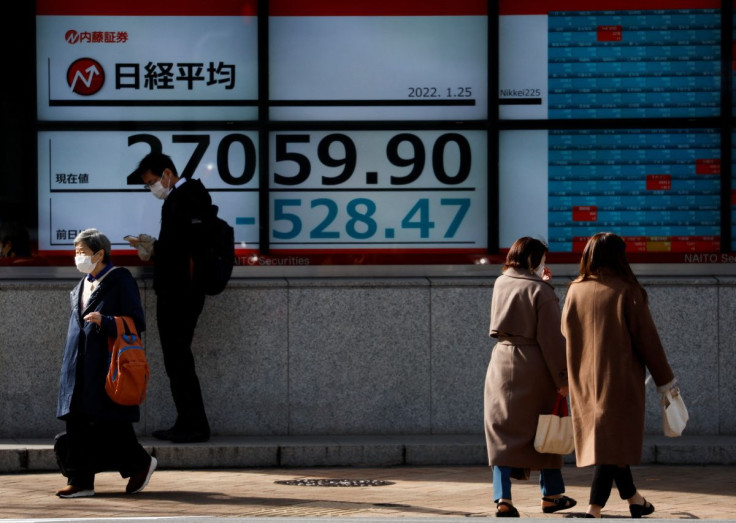World Stocks Bounce As Investors Eye Putin's Next Steps In Ukraine

Global stocks broke a four-day slide on Wednesday and demand for safe-haven assets waned, with investors waiting to see Russian President Vladimir Putin's next move after he sent troops into separatist regions of Ukraine.
The initial push to send soldiers to Donetsk and Luhansk this week triggered coordinated, yet modest sanctions from Western countries, albeit with the prospect of more to come if Moscow seeks to push further into the country.
After chalking up a 3.6% fall since last Friday, the MSCI World Index, a leading gauge of equity markets globally, edged off its highs to trade up 0.2%, helped by broad gains across Europe's major bourses.
The FTSE 100 was up 0.3% and the pan-European STOXX Europe 600 index rose 0.6%, bolstered by strong company earnings, including from automaker Stellantis. Earlier, MSCI's index of Asia-Pacific shares outside Japan rose 0.4%.
S&P 500 stock futures pointed to a 0.6% higher open, rebounding after officially entering correction territory in the prior session.
"In the end what investors want to know is: does this impact earnings or not? If not, the temptation to buy the dip is high," said Dirk Willer, global head of macro and asset allocation at Citi.
"Markets tend to see geopolitical events as opportunities," he said, adding past years had shown this was the correct policy to adopt.
Niklas Ekvall, chief executive of Swedish pension fund AP4, said the scheme had an allocation to equities of around 60% and planned to keep it there for now, eyeing a better risk-return than for fixed income, which accounts for 25% of its assets.
"In general, the geopolitical situation (in Ukraine), as long as it doesn't escalate further, will have quite a limited impact on financial markets," Ekvall said.
"Then of course, if it escalates to a full blown war in Ukraine, with further tensions into NATO, that's a different situation."
Commodity prices remained elevated, with traders nervous that supplies could be curtailed if the situation on Europe's eastern edge escalates.
Europe's benchmark gas price extended its morning gains to trade up 5.8%, adding to a hefty gain a day earlier after Germany halted Russia's Nord Stream 2 gas pipeline.
Brent crude, which hit seven-year highs this week, reversed course as European trade bedded in and was last down 0.6% at $96.30 a barrel, while West Texas Intermediate was down 0.6%. [O/R]
After their biggest jump in three-and-a-half years on Tuesday, wheat futures pared early losses to trade down 0.2%. Corn futures also pulled back from an eight-month high and held steady, down 0.5%. [GRA/]
Gold pulled off its lows and was last down 0.2% at $1,894 an ounce.
CENTRAL BANKS TOO
The crisis in Ukraine and the potential for surging energy prices come on top of nerves about whether the global economy can handle rising interest rates.
Citi's Willer said he did not expect events in Ukraine to deter central banks from tightening policy, with the investment bank sticking to a forecast for a 50 basis point hike from the U.S. Federal Reserve in March.
"I doubt the geopolitics will mean any major change as the Fed are seen by many as so far behind the curve," Willer said.
"Usually the mantra is that high oil prices are a tax but that's gone out of the window as inflation pressures have been so strong and so underestimated by central banks."
A fresh reminder of that came on Wednesday, with January euro zone inflation data showing a 5.1% rise year-on-year. Meanwhile Bank of England Governor Andrew Bailey warned there was a clear risk high levels of inflation could prove sticky.
Among European bond markets, euro zone yields gave back early gains, with the German 10-year yield at around 0.24%. U.S. Treasuries were last at 1.97%.
The Reserve Bank of New Zealand announced its third consecutive rate hike on Wednesday, lifting its benchmark cash rate by 25 basis points to 1%, as expected, but surprising investors with a hawkish tone.
The New Zealand dollar rose 0.8% on the news and is on its longest streak of daily gains in almost two years. [NZD/]
Other currencies were fairly muted, though hopes that war in Ukraine can be avoided took some of the bid from safe havens and helped the euro rise 0.1% against the dollar [FRX/]
© Copyright Thomson Reuters 2024. All rights reserved.




















